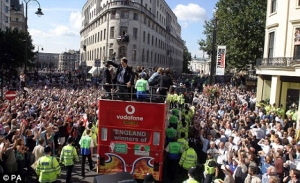SIX former England cricket captains face losses totalling millions of pounds after investing in film schemes.
Half of the England cricket team who in 2005 wrested the Ashes back from Australia for the first time in 18 years, have been caught up in an investment crisis that has also seen scores of footballers face losses totalling an estimated £100m after investing in film partnerships and failed property ventures.
Documents leaked last week reveal that Michael Vaughan — the captain in 2005 — Andrew Flintoff and Marcus Trescothick invested a total of more than £3m in film schemes that have since been challenged by HM Revenue & Customs (HMRC), leaving investors facing massive tax demands.
Other England cricketers facing huge tax demands include Alec Stewart, Paul Collingwood and Mark Butcher, who all captained their country, and the retired fast bowler Matthew Hoggard.
When contacted none wanted to comment except Butcher, who emailed: “None of that is news to me as you are doubtless well aware! I am taking advice on the situation and have nothing further to add. This whole affair has caused me an awful amount of stress.”
Film partnerships — aggressive, high-risk tax vehicles — involved clients putting in some of their own money, which was then supplemented several times over with huge loans from banks. These investments then generated tax rebates for the players, which are now being retrospectively challenged by HMRC.
Stuart Cotton, a former HMRC tax inspector who now runs the website Investor-Rescue.org and represents dozens of sportsmen who are seeking redress, said: “There is no shame in being involved in such investments and I am working with my clients to help them avoid complete financial ruin.”
Cricketers including Flintoff, Vaughan, Trescothick, Butcher, Hoggard, Collingwood and Ashley Giles, invested about £5m in film schemes. Cotton has estimated they face liabilities of £3.5m including interest and investment losses.
All the cricketers invested in film partnerships promoted by the Ingenious group, which has backed Hollywood movies including Avatar and Life of Pi. However, the company is now at the centre of litigation with HMRC.
Ingenious has said it is proud of its investment in films and has previously accused HMRC of failing to distinguish between commercial businesses and tax avoidance schemes. The company is challenging HMRC and remains confident of the outcome albeit they have lost all previous appeals.
Jon Alexander, managing director of Arundel Wealth Management, who has been asked by the Professional Cricketers’ Association to help some of the affected players manage their financial positions, has previously said some are facing “very substantial demands”.
In a statement a company representative said; “given the delicacy of the subject and the confidentiality of our high-profile clients, we are not in a position to comment on them or their financial situations”.
Other sports stars facing losses from property investments include some of the world’s leading golfers. Lee Westwood, the former No 1, Darren Clarke, who won the Open Championship in 2011, and David Howell, a former Ryder Cup star, all face substantial losses in a disastrous American property venture.
Charlotte Harbor, a condominium development on Florida’s rural west coast, was sold by Kingsbridge Asset Management, which was based in Nottingham, and advised scores of footballers, including the Manchester United and England stars Rio Ferdinand and Wayne Rooney, as well as leading managers, including Martin O’Neill, the Republic of Ireland manager, and Steve McClaren, the former England manager now at Newcastle.
Westwood and Howell each bought two apartments. After paying local taxes, management and other fees they each face losses of $750,000, according to US public records. Clarke, the golfer from Northern Ireland, bought his flat for $385,000 in 2006 and sold for $85,000 in 2011.
Some England cricketers fared even worse. Alec Stewart, the former England captain, and his wife Lynn, bought at the same price and sold for $60,000 in 2011. Darren Gough, the Yorkshire and England pace bowler, had his repossessed in 2010, one of more than a dozen Kingsbridge clients to lose their apartments in this way.
In total, more than 30 condominiums have been sold by Kingsbridge clients at an average price of $100,000. They were originally bought for between $385,000 and $405,000. The apartments generated more than £800,000 in commissions for Kingsbridge, according to leaked company documents.
Kingsbridge clients, including the golfers, cricketers, 31 footballers and several managers, lost an estimated £25m in total on Charlotte Harbor. Kingsbridge was placed into voluntary liquidation in 2010.
A spokesman for David McKee and Kevin McMenamin, former directors of Kingsbridge Asset Management, said: “Neither David or Kevin have ever sought to benefit financially at the expense of their clients and their alignment of interests have always been clear.
“They often co- invest with their clients, as was the case at Charlotte Harbor where they both personally acquired property on the development on the same terms as their clients.”
They said that some of the cricketers and golfers were advised by others within the company.

